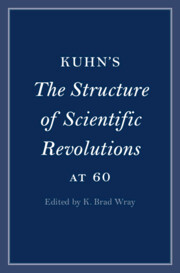Book contents
- Kuhn’s The Structure of Scientific Revolutions at 60
- Cambridge Philosophical Anniversaries
- Kuhn’s The Structure of Scientific Revolutions at 60
- Copyright page
- Dedication
- Contents
- Figures
- Tables
- Contributors
- Acknowledgments
- Abbreviations
- Introduction
- Part I Writing Structure
- Part II Normal Science and Science Education
- Part III Incommensurability, Progress, and Revolutions
- Part IV Kuhn’s Impact on the Philosophy, Sociology, and History of Science
- 12 The Ambiguous Legacy of Kuhn’s Structure for Normative Philosophy of Science
- 13 Thomas Kuhn and the Strong Programme
- 14 Kuhn and the History of Science
- Bibliography
- Index
12 - The Ambiguous Legacy of Kuhn’s Structure for Normative Philosophy of Science
from Part IV - Kuhn’s Impact on the Philosophy, Sociology, and History of Science
Published online by Cambridge University Press: 05 January 2024
- Kuhn’s The Structure of Scientific Revolutions at 60
- Cambridge Philosophical Anniversaries
- Kuhn’s The Structure of Scientific Revolutions at 60
- Copyright page
- Dedication
- Contents
- Figures
- Tables
- Contributors
- Acknowledgments
- Abbreviations
- Introduction
- Part I Writing Structure
- Part II Normal Science and Science Education
- Part III Incommensurability, Progress, and Revolutions
- Part IV Kuhn’s Impact on the Philosophy, Sociology, and History of Science
- 12 The Ambiguous Legacy of Kuhn’s Structure for Normative Philosophy of Science
- 13 Thomas Kuhn and the Strong Programme
- 14 Kuhn and the History of Science
- Bibliography
- Index
Summary
This chapter examines the legacy of Kuhn’s Structure for normative philosophy of science. It begins with an examination of Kuhn’s normative methodology and his position that historical cases provide evidence for philosophical claims. Kuhn’s philosophical methodology is insufficiently articulated, and his utilization of case studies is subject to objections implied by Pitt’s dilemma of case studies. The chapter subsequently examines the post-Kuhnian methodological positions of Ian Hacking, Helen Longino, Michael Friedman, and Hasok Chang. These views suggest alternative methodological strategies in the history and philosophy of science (HPS) tradition for addressing normative issues. It concludes by articulating some outstanding methodological challenges for the pluralist tradition of HPS ? associated with the Stanford and Minnesota schools of philosophy of science ? that emerged in the 1980s and remains influential.
Keywords
- Type
- Chapter
- Information
- Kuhn's The Structure of Scientific Revolutions at 60 , pp. 217 - 234Publisher: Cambridge University PressPrint publication year: 2024

